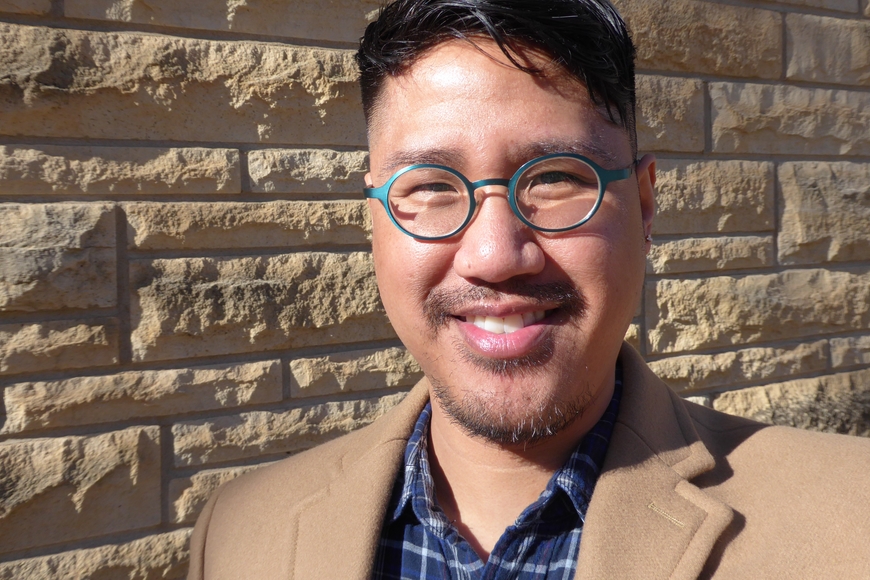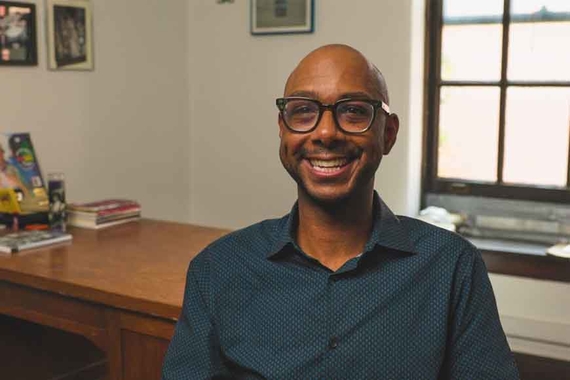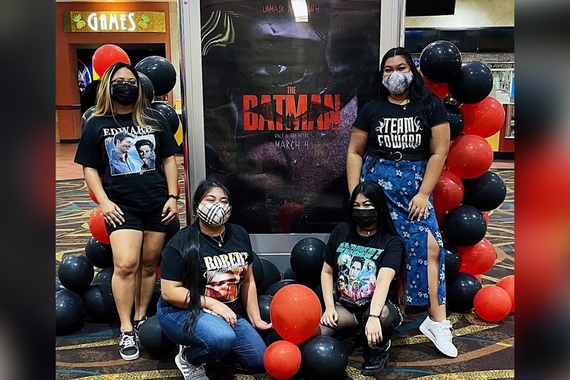Alumni Profile: Tom Sarmiento
Thomas X. Sarmiento earned his PhD in 2014 with his dissertation The Heartland of Empire: Queer Cultural Imaginaries of Filipinas/os in the Midwest, which was nominated for the University of Minnesota Best Dissertation Award in Arts & Humanities and for the American Studies Association Ralph Henry Gabriel Prize. He is currently an assistant professor of English at Kansas State University and a faculty member of their Department of Gender, Women, and Sexuality Studies. His article “The Empire Sings Back: Glee’s Queer Materialization of Filipina/o America” appeared in the Summer 2014 Visual Culture & Race special issue of MELUS: Multi-Ethnic Literature of the United States.
What brought you to UMN? What drew you to your chosen field? What do you love about what you do?
With the encouragement of one of my undergraduate mentors, I applied to the American studies PhD program at the University of Minnesota. I was particularly attracted to the program’s interdisciplinary curriculum, the array of faculty with whom I could work both within the department and across the campus, and the opportunity to live outside of southern California (a region which, up until that point, I had lived all my life). As a queer-identified son of Filipinx immigrants, my personal experiences provided an entry point to explore how I and others similarly positioned in US society could create spaces to tell our stories—stories often relegated to the margins of history and culture. However, relocating to the Midwest actually provided me with a critical vantagepoint to see racial and sexual formations differently, to unsettle the boundary between the so-called normal and nonnormative. Had I not moved to the Twin Cities, I would not have produced the scholarship that became my dissertation and that I am transforming into a book. In my work as a professor and researcher of literature and culture, I get to examine how cultural production is shaped by, but also shapes our understanding of, social identity and our attachments to place; this is what I love most about my job: reading and analyzing texts that are pleasurable and provocative, and inviting others to be moved by the power of creative expression.
How have your experiences as a graduate student prepared you for what you are doing now? How has it influenced how you teach, mentor, conduct research, or determine what lines of questioning you choose to pursue?
As a scholar who works at the intersections of Filipinx diaspora studies, queer studies, and cultural studies, I am constantly reading texts from various disciplines and fields; some of them are directly related to my areas of research, while others may seem tangential but nevertheless inspire me to conceptualize ideas in novel ways. I developed this habit from my mentors in the department, who encouraged my peers and me to read widely and to be open to pursuing unintended lines of inquiry, rather than remain wedded to our intended research projects. Acquiring a breadth of knowledge through coursework and through formal and informal reading groups, I was able to recognize how my particular scholarly interests in Asian American studies and queer theory fit within the larger field of American studies. I especially appreciated the intellectual freedom my co-advisors Kale Fajardo and Kevin Murphy granted me, which instilled confidence in my ability to make connections where most people see none—for example, that the traces of US empire in the Philippines are actually not that difficult to find throughout the Midwest.
In addition to my solid intellectual training, the program prepared me to become a confident teacher, especially in front of hundreds of students. The experience of designing and teaching my own syllabus for three different courses made my first professional teaching position after graduate school less intimidating. In observing others in the department teach their courses, I also discovered the power of making the curriculum culturally and regionally relevant to students. This is an approach I have taken as an instructor at K-State. For example, in my “QueerAsian Midwest” course, we discussed the history of Asian settlement in Kansas and how that challenged my students’ perception of their home state.
What fond memories do you have from your time as a graduate student? What do you miss about being on campus or living in the Twin Cities?
As a California transplant, one of my fondest memories of being a Minnesota graduate student is experiencing my first snow; living in Kansas, where the weather is more temperate, I actually miss seeing the ground covered in snow (though I’m glad that by March, the weather here is actually spring-like). Another fond memory is writing in community with fellow cohort members Karla Padrón and Myrl Beam in Wilson Library as we prepared for prelims, with fellow American studies graduate student Rudy Aguilar at the Nicollet Spyhouse during the humid summers as our projects began to take shape, and with Jasmine Kar Tang, Tammy Owens, and Jesús Estrada-Perez—also in American studies—as we dissertated while working at the Center for Writing, all of whom have since completed their dissertations as well; such a quotidian act actually demystified the research and writing process and challenged the myth that humanities writing happens in isolation.
The many things I miss about living in the Twin Cities include the public transportation; the unique restaurant options, especially for vegetarians; the lakes; and the many cultural offerings, from the MIA, to the Walker Art Museum, to the annual Fringe Festival. But most of all, I miss the vibrant communities with which I was a part, both on and off campus.
How has your intellectual life evolved since you graduated? What projects are you currently working on?
Since graduating from Minnesota, I have become more confident as an emerging scholar. Much of that can be attributed to overcoming my reluctance to ask for advice and to network; however, having the degree in hand has certainly played a considerable role in my confidence as well. Continuing to being open to exploring interests tangentially related to my primary research focus, I have been able to re-see my work in new and exciting ways. The critical distance from my dissertation has reinvigorated my passion for my research, driving me to transform it into my first book manuscript. Working with colleagues in English and gender, women, and sexuality studies at K-State and teaching course in literature, film, and popular culture, I have discovered new strands of research. Alongside with work in analyzing queer cultural representations of Filipinxs in the Midwest, I also am analyzing how contemporary Filipinx literature indexes feminist and queer political coalitions. Building upon my book manuscript, I have begun to explore what happens when queer and Filipinx cultural production decenters identity—that is, what happens when the content of queer and Filipinx cultural production moves away from questions of sexual and racial-ethnic identity exclusively; what other stories can be told?
What advice do you have for current graduate students in your field?
To current graduate students pursuing interdisciplinary studies in race, gender, sexuality, and empire, I would encourage them to constantly remind themselves of their passions—including but also beyond the scholarly—and to not let disciplines and institutions define them. Reminding yourself why you decided to pursue graduate study in the first place can motivate you during those times when it seems as if your scholarship does not matter. Especially for those who seek to pursue a career in academe, I recall how discouraging the academic job market was (and continues to be); however, mentors and friends lovingly reminded me this was not personal but structural. Remaining cautiously optimistic but also realistic has sustained me in my journey from contingent to tenure-track employment. Finally, I would proffer being open to the unexpected. Ten years ago, I would have never imagined this is what my life would look like; in fact, I had not planned on pursuing a doctoral degree. And yet, I would not have it any other way.
What books or blogs have you been reading recently? Any recommendations for our readers?
Much of my recent reading reflects the texts I had assigned to my undergraduate students last semester in my Fiction into Film class, which included Carson McCullers’ Reflections in a Golden Eye, Philip K. Dick’s Do Androids Dream of Electric Sheep?, and Stephen Chbosky’s The Perks of Being a Wallflower. I also recently finished rereading the Harry Potter series for leisure. On my nightstand, I am reading Paul Monette’s AIDS memoir Borrowed Time. A few junior scholars working in Filipinx studies and I have formed a virtual reading group to keep abreast of new publications. Of the texts we have read, I would highly recommend Denise Cruz’s Transpacific Femininities, Victor Mendoza’s Metroimperial Intimacies, and Vernadette Gonzalez’s Securing Paradise. Another book I would recommend is Robyn Wiegman’s Object Lessons, which I am currently reading. Next in my reading queue is American studies alumnus Ryan Murphy’s Deregulating Desire, Colin Johnson’s Just Queer Folks, Amy Brandzel’s Against Citizenship, and Nerissa Balce’s Body Parts of Empire. Blogs I regularly read include Micechat and Towleroad.



